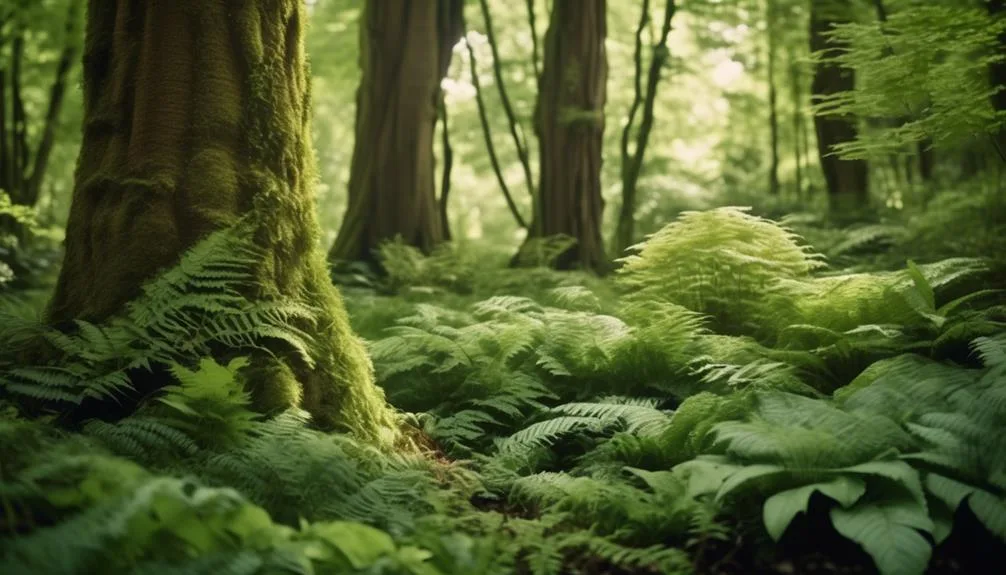Discovering the right plants to grow alongside beech trees is like finding the missing pieces to a nature puzzle. These plants not only enhance the beauty of beech trees but also help them thrive.
From shade-tolerant to flowering varieties, each plant brings its own benefits to create a thriving ecosystem.
Stay tuned to learn how these companion plants can elevate your outdoor space while supporting the health of your beech trees.
Shade-Tolerant Plants
When planting shade-tolerant companions for your beech trees, it's essential to consider their ability to thrive in low light conditions and complement the majestic presence of the beech tree. Understory plants like ferns, hostas, and wild ginger are excellent choices. They not only tolerate shade but also enrich the soil with their decaying leaves, providing essential nutrients for the beech tree's roots.
These plants create a harmonious understory, adding layers of texture and color beneath the beech tree's canopy. The dense foliage of the beech tree creates a unique microclimate, and these shade-tolerant companions are well-suited to thrive in such conditions.
As they grow, they form a natural carpet, preventing soil erosion and retaining moisture, creating an environment that supports the health and vitality of the beech tree.
Nitrogen-Fixing Plants
Consider incorporating nitrogen-fixing plants as companions for your beech trees, as they play a vital role in enhancing the soil's fertility and promoting the overall well-being of the ecosystem. Companion planting with nitrogen-fixing plants not only benefits the beech trees but also the surrounding plants and wildlife. These plants have the unique ability to convert atmospheric nitrogen into a form that is readily available for other plants, thus improving soil fertility. This is particularly beneficial for beech trees, as they thrive in nutrient-rich soil. Below are some excellent nitrogen-fixing plants that can be paired with beech trees to create a mutually beneficial environment:
| Nitrogen-Fixing Plants | Benefits |
|---|---|
| Clover | Adds nitrogen to the soil, prevents erosion |
| Alfalfa | Improves soil structure, attracts beneficial insects |
| Peas | Enriches the soil, provides ground cover |
Incorporating these nitrogen-fixing plants as companions for your beech trees will not only enhance the soil fertility but also contribute to the overall health of your ecosystem.
Ground Cover Plants
Enhance the soil fertility and provide additional benefits to your ecosystem by introducing ground cover plants that complement the nitrogen-fixing companions for your beech trees.
Ground cover plants play a crucial role in maintaining soil protection and controlling erosion, making them essential for the health of your beech tree's root system. These plants not only prevent soil erosion but also create a protective layer, preserving moisture and nutrients essential for the tree's growth.
Additionally, ground cover plants are effective in attracting pollinators, thereby enhancing biodiversity in your garden. By introducing a variety of ground cover plants, you can create a vibrant and thriving ecosystem around your beech trees.
- Soil protection and erosion control
- Pollinator attraction and biodiversity enhancement
Flowering Plants
Flowering plants around your beech trees add vibrant colors and attract beneficial pollinators, enhancing the beauty and biodiversity of your garden ecosystem.
When selecting flowering plants to accompany your beech trees, consider those that attract pollinators, such as bees. Bees are drawn to a variety of flowers, including lavender, bee balm, and sunflowers, due to their rich nectar and bright colors. These pollinator-attracting flowers not only create a visually stunning garden but also support the essential role of bees in the ecosystem.
When designing your garden, intersperse these flowering plants among your beech trees to create a harmonious and beneficial environment. Observing bee behavior around these flowers can be a delightful and educational experience, offering a deeper connection to the natural world right in your own backyard.
Wildlife-Supporting Plants
Introducing wildlife-supporting plants around your beech trees creates a flourishing ecosystem that provides food and habitat for a diverse array of beneficial creatures. By carefully selecting plants that support wildlife, you can create a balanced and sustainable environment for your beech trees.
Consider the following options:
- Pollinator Friendly Flowers: Planting a variety of flowers such as lavender, coneflowers, and bee balm can attract bees, butterflies, and other pollinators that are essential for the health of your beech trees.
- Native Habitat Restoration: Incorporating native plants like wild geraniums, milkweed, and goldenrod helps restore the natural habitat, providing food and shelter for birds, insects, and small mammals.
- Supporting Beneficial Insects: Plants like yarrow, dill, and fennel attract beneficial insects like ladybugs, lacewings, and parasitic wasps, which help control pests and maintain a healthy ecosystem.
Conclusion
Incorporating these diverse companion plants around your beech trees can enrich your garden with beauty and functionality, creating a thriving ecosystem.
By carefully selecting shade-tolerant, nitrogen-fixing, ground cover, flowering, and wildlife-supporting plants, you can enhance the health and appeal of your outdoor space.
Happy gardening!

My interest in trees started when I first saw the giant sequoias in Yosemite.
I was a teenager then, and I remember thinking, “I need to learn more about this.”
That moment stuck with me.
A few years later, I went on to study forestry at Michigan Tech.
Since graduating, I’ve worked in a mix of hands-on tree care and community education.
I’ve spent over ten years helping people understand how to plant, maintain, and protect the trees in their neighborhoods.
I don’t see trees as just part of the landscape.
They are living things that make a real difference in our daily lives.
